
What is ‘bed rotting’ and is it actually self-care?
With 3.2 million views of the TikTok tag ‘bed rotting’ and copious videos, it seems Gen Z are embracing a slower pace of life, with self-care happening in bed. Creators are sharing their morning routines and experiences of bed rotting for self-care, but the trend has come under fire for its potential health implications. Content creator Vanessa Hill describes it in her video as: “When you do literally nothing but laying in bed. It is the end of optimisation.” According to psychologist and The Beekeeper House founder and CEO Robert Common, “Bed rotting is the practice of spending an extended amount of time during your normal waking hours, or even a whole day, lying in bed. You could be watching films, scrolling on social media, talking on the phone, eating, or anything you would normally do if you were at home relaxing. “This differs from bed rest to recover from illness or injury, and is often used as a method of dealing with stress or anxiety, or as a self-care tool,” he explains. This is a shunning of hustle culture and productivity in the pursuit of self-care. “Although bed rotting might be the hottest self-care method trending on TikTok, the idea behind it isn’t new,” says Common. “People have been taking ‘duvet days’ for a long time now, and many companies even have policies around this, allowing staff an entitlement to several duvet days per year. “What we are seeing with this trend is more a case of social media driving conversations among young people. It could be especially appealing to Gen Zs, as many report feeling more stressed than other generations, so taking time away from it all to recuperate mentally could be especially appealing,” he explains. But, is it actually self-care or is it doing more harm than good? The benefits There are some positive aspects to this grimly named practice. “Taking some mental downtime to recharge has many benefits,” says Common. “We live in a very fast-paced world, so stepping back, reconnecting with yourself, recharging your batteries and rebuilding some mental and physical energy is always a positive thing to do. In fact, it’s something that more of us should be scheduling into our routines if we can. “Having this downtime puts us in a stronger position to reassess our goals and find the motivation to reach for them, manage our commitments and explore personal interests and hobbies without burning ourselves out,” he explains. Damage to mental health and physical wellbeing “Spending the odd day here and there throughout the month bed rotting is unlikely to do you any damage – quite the reverse. However, as with all things in life, balance is key,” explains Common. For example, “If bed rotting becomes a dominating factor or behaviour in how you spend your free time, this could be an indicator of depression or burnout. If you suspect you’re experiencing these – or other underlying health issues – it’s important to seek appropriate support to help identify the root causes, and find healthy ways to manage them,” he says. Other practices may be more beneficial. “Whilst rest is important for wellbeing, exercise is also a powerful tool for maintaining good mental and physical health, so ultimately, it’s about not being on either extreme of the spectrum.” Impact on sleep Bed rotting can impact the amount and the quality of sleep you get, too. “An important factor of good sleep hygiene is reserving your bed for sleeping only,” Common says. “Watching Netflix, scrolling on your phone and eating are some of the most obvious activities that go hand-in-hand with bed rotting, but it can make it harder to follow a good sleep schedule. “It’s also important to expend enough energy during the day to fall asleep on time, and maximise the benefits that come with proper sleep,” he says. So, while a few duvet days here and there could be counted as self-care, bed rotting too often may leave you worn out and unhappy. Read More Charity boss speaks out over ‘traumatic’ encounter with royal aide Ukraine war’s heaviest fight rages in east - follow live Beekeeping has gone viral – but how easy is it? Women in certain professions ‘may be at higher risk of ovarian cancer’ – study Everything you need to know about sleep in pregnancy
2023-07-11 21:52

'Too much': Burger King's new offering in Thailand has no meat and 20 slices of cheese
Burger King is causing a stir in Thailand with its new offering: a burger with no meat and a jaw-dropping amount of cheese.
2023-07-11 18:55
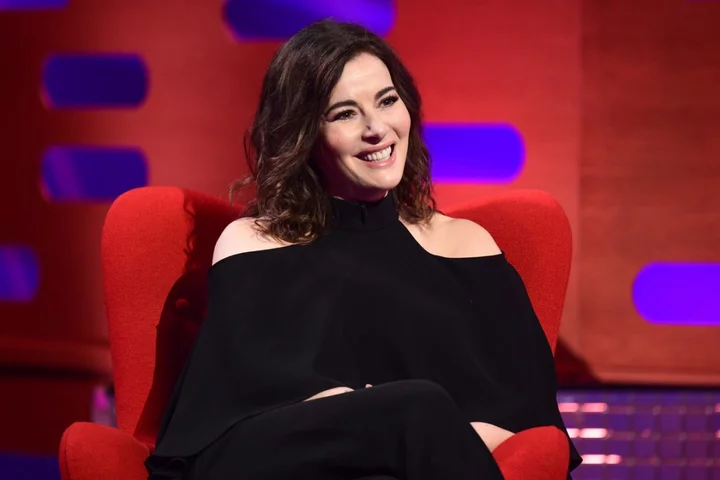
Nigella Lawson says she rarely hosts extravagant dinner parties anymore
Nigella Lawson is ditching extravagant dinner parties for more relaxed mealtimes with friends. You might have assumed that the celebrity chef and food writer, who is known for the polished, decadant style of her TV cooking shows, regularly hosts glamorous dinner parties for her friends and family. But in a new interview, Lawson, 63, has explained that this is now a rare occurrence, and that she prefers to serve Twiglets to her friends instead. “I’ll have a person or a couple of people over quite often and I keep planning to have people round in a proper, grown-up way but I haven’t yet,” the food writer told The Times, explaining she has got “out of the habit” of hosting dinner parties. Lawson revealed that she prefers a more relaxed environment and would happily encourage her friends to arrive at her home wearing their pyjamas. “I’m very happy for a friend to come over in their pyjamas to have supper.” “I recently served Twiglets as a starter,” she told the publication. “There were some Americans there and I felt it my duty to introduce them.” She added that the idea of clearing plates, knives and forks before the main course is “so unrelaxing” and can make things feel “choreographed”. “I like to do a big plate of food, taking it out and seeing everyone eat. I like abundance and I feel that’s easier to do with one course,” she said. When she does host friends, Lawson prefers a more laid-back buffet-style dinner. At her open-plan home in Chelsea, she has two tables, one for the people to be seated at, and one for the food. “I think narrow tables are better for conversation, so we sit at one and I put the dinner on the other so people can help themselves.” It comes as Lawson responded to a viral “girl dinner” trend that is sweeping the internet. On Saturday, The New York Times detailed the new TikTok phenomenon in an article with the headline: “Is It a Meal? A Snack? No, It’s ‘Girl Dinner’”. According to the publication, the phrase was coined a few months ago by TikTok user Olivia Maher, who posted a video in which she spoke about the virtues of a medieval-style dinner. “I can’t find the TikTok right now but a girl just came on here and said in the Medieval times, peasants had to eat nothing but bread and cheese and how awful that was,” she says in the clip, which has since been watched more then one million times. “And she was like, ‘That’s my ideal meal,’” Maher added before showing her dinner to the camera, revealing a selection of bread, cheese, grapes and pickles. The article has prompted a mixed response on social media, with some accusing it of promoting disordered eating while others claim the diet is nothing new and mimics those adopted by mediterranean cultures. Lawson responded to the article by tweeting: “And we call them Picky Bits.” Read More Woman shares co-worker’s ‘infuriating’ response to her decision to not have children 5 late summer blooms to plant now Buckingham Palace responds to Joe Biden’s ‘protocol breach’ with King Charles ‘We call them Picky Bits’: Nigella Lawson responds to viral ‘Girl Dinner’ trend Get set for Wimbledon with top pastry chef’s strawberry recipes How to cook kohlrabi
2023-07-11 18:49
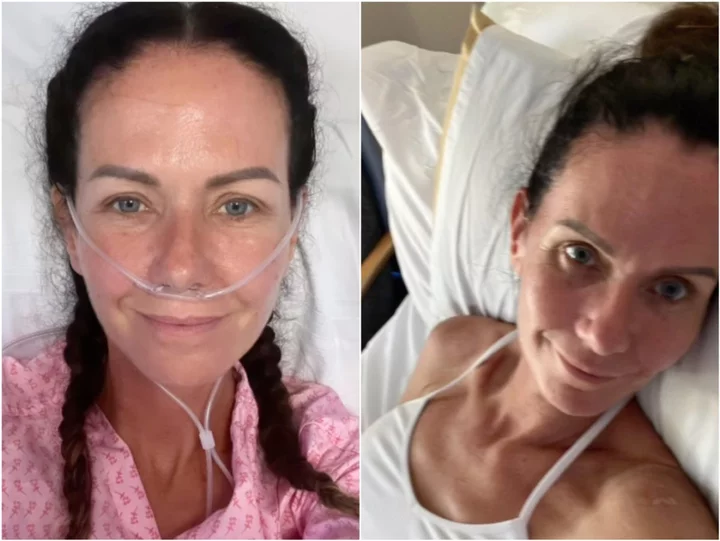
Ben Cohen’s ex-wife Abby says she had only ‘one symptom’ before cancer diagnosis
Ben Cohen’s ex-wife Abby has been diagnosed with cancer. The professional photographer, 44, who shares two children with Cohen, shared a video to her Instagram account documenting her experience with cancer, describing it as the “toughest yet”. In the video, Abby is seen walking into a hospital before undergoing different tests. Several clips show her in a hospital bed, wearing a stoma bag while she is surrounded by her loved ones. Writing on Instagram, Abby recalled that she visited a doctor after having experienced only one symptom. She did not specify where the cancer had been found. “This was and is the toughest yet. I’m unlucky, but lucky, to have been warned only once with a symptom of this terrible illness,” wrote Abby in the post’s caption. She thanked the NHS for “saving” her “life” and taking care of her when she was so “scared and most vulnerable”. The photographer urged her followers to “never ignore” their bodies when warning signs present themselves. “I didn’t [ignore them] and it’s given me a chance to live my new life. In time and with the right treatment, I’m hoping this WILL all be a distant memory for me,” she said. Abby and Ben share twin 15-year-old daughters, Harriette and Isabelle. In the video, the children are seen supporting their mother during her time in hospital. Their father Ben, who is a former England Rugby player, and Abby were married for 11 years before they split in 2014. Cohen went on to start a relationship with his Strictly Come Dancing partner Kristina Rihanoff, whom he was partnered up with during his appearance on the show in 2013. Ben and Kristina welcomed a daughter, Mila, in 2016. The photographer went public with her new partner, David, in 2020. Speaking to MailOnline previously, Abby said that she did not want to be known for her past relationship. “I thought, ‘Everyone still labels me Ben’s ex’ but I’m not that Abby any more. I’m me. I’ve got my two girls. My life. I’ve finally met a really nice man. I want to be known as ‘Abby the good photographer’ or ‘Abby the great mum’. I’m very different. I’m stronger,” she said. Abby has continued to praise Ben as a “fantastic hands-on father”. Read More Woman shares co-worker’s ‘infuriating’ response to her decision to not have children Buckingham Palace responds to Joe Biden’s ‘protocol breach’ with King Charles 5 late summer blooms to plant now Maria Menounos says her tumour ‘doubled’ after first cancer symptoms were overlooked How to check if you have skin cancer: Symptoms and signs to look out Jonnie Irwin makes rare red carpet appearance as he says ‘every day is a gift’
2023-07-11 17:25

Women in certain professions ‘may be at higher risk of ovarian cancer’ – study
Hairdressers, beauticians and accountants could be at a higher risk of developing ovarian cancer, a new study suggests. Those working in sales, retail, clothing and construction industries could also carry a higher risk according to a new study published in the journal Occupational and Environmental Medicine. But the authors of the study stressed that “inferences from the results are limited” as they called for more work to examine the links between ovarian cancer risk and different occupations. The team, led by academics at the University of Montreal in Canada, examined data on 491 Canadian women with ovarian cancer and compared it with 897 women without disease. We observed associations suggesting that accountancy, hairdressing, sales, sewing and related occupations may be linked to excess risks Report authors The researchers linked occupations to ovarian cancer risk. They also compared this data to the Canadian job-exposure matrix to examine any potential workplace exposures – for example, if they are more likely to come in contact with a certain chemical while at work. After accounting for potentially influential factors, they found that some jobs may be linked to a heightened risk of disease. Those who had worked as a hairdresser, barber or beautician appeared to have a three-fold higher risk. Meanwhile, women who worked in accountancy for a decade were twice as likely to develop the disease while construction workers were almost three times as likely. Shop assistants and sales people had a 45% increased risk while those who make or alter clothes appeared to have an 85% increased risk. The researchers said that those found to have a higher risk were also more likely to be exposed to a number of “agents” including: cosmetic talc, ammonia, hydrogen peroxide, hair dust, synthetic fibres, polyester fibres, organic dyes, and pigments and bleaches. “We observed associations suggesting that accountancy, hairdressing, sales, sewing and related occupations may be linked to excess risks,” the authors wrote. “Further population-based research is needed to evaluate possible hazards for female workers and occupations commonly held by women.” In a linked editorial, academics from the National Cancer Institute in Maryland in the US, point out that women are under-represented in “occupational cancer research studies”. They said the study “reminds us that while the lack of representation of women in occupational cancer studies — and indeed, even potential strategies to address this issue — have been long recognised, there is still a need for improvement in studying women’s occupational risks. “By excluding women, we miss the opportunity to identify risk factors for female-specific cancers, to evaluate whether sex-specific differences in risk occur, and to study exposures occurring in occupations held primarily by women.” Commenting on the study, Kevin McConway, emeritus professor of applied statistics at the Open University, said: “The researchers clearly state that their study was ‘exploratory’ and that it is ‘aimed at generating new hypotheses’. “So, it is certainly not claiming that they have definitely found occupational groups, or exposures to chemicals and other agents, that are associated with ovarian cancer. “Even less are they claiming that being in certain occupations, or being exposed to certain chemicals at work, causes an increased risk of ovarian cancer. “Instead, they aimed at suggesting occupational groups, and agents to which women might be exposed at work, that possibly might be associated with ovarian cancer risk, and they say clearly that further research is needed to ‘give a more solid grounding’ to any conclusions that might be drawn about associations between what women do at work and their risk of getting ovarian cancer.” Read More Charity boss speaks out over ‘traumatic’ encounter with royal aide Ukraine war’s heaviest fight rages in east - follow live Beekeeping has gone viral – but how easy is it? Everything you need to know about sleep in pregnancy Myleene Klass: Government does not deserve power if miscarriage policy unchanged
2023-07-11 16:52
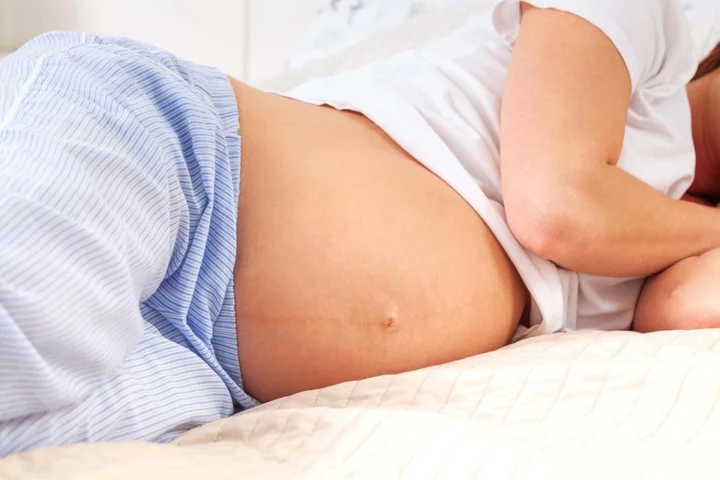
Everything you need to know about sleep in pregnancy
Sleep matters at the best of times, but when you’re growing new life, getting a good night’s rest is incredibly important. But, pregnancy and sleep do not often go hand in hand. “Many people experience changes in their sleep patterns and quality during pregnancy,” says Dr Chun Tang, medical director and GP at Pall Mall Medical in Manchester. “Hormonal fluctuations, physical discomfort, frequent urination and anxiety can contribute to sleep disturbances. Some people may find it more challenging to fall asleep or stay asleep throughout the night, leading to altered sleep-wake cycles and a disrupted circadian rhythm.” Your circadian rhythm will change “During pregnancy, the circadian rhythm, which is the internal biological clock that regulates various physiological processes, undergoes certain changes,” says Tang. “Things like hormonal changes, sleep disruptions, changes in activity and energy levels and increased sensitivity to light, can affect your circadian rhythm.” Warmer body temperature “During pregnancy, basal body temperature (the body’s resting temperature) tends to be slightly elevated, due to hormonal changes, particularly increased levels of progesterone,” he explains. “This can result in a feeling of warmth or increased body heat. Higher basal body temperature can make it uncomfortable to sleep, especially in combination with external factors, like warm weather or a warm sleeping environment.” Some people may also experience night sweats, particularly during the later stages of pregnancy, Tang notes. “Night sweats are episodes of excessive sweating during sleep, which can lead to discomfort, disrupted sleep, and difficulty falling back asleep. Hormonal fluctuations and increased blood flow during pregnancy can contribute to these. “Hormonal changes during pregnancy can also trigger hot flushes, sudden feelings of intense heat and sweating that typically affect the face, neck, and chest. Hot flushes can occur during the day or at night, affecting sleep. But if you have a persistent fever or feel unwell, you should consult your GP,” he says. Vivid dreams “There have been numerous reports of people having more vivid dreams during pregnancy. Hormones, increased emotional sensitivity, and changes in sleep patterns can contribute to the intensity and frequency of dreams,” says Tang. “Pregnancy often brings about a range of emotional and psychological changes. Heightened emotions, anxiety, excitement, and anticipation can influence the content and intensity of dreams. Dreams may reflect the concerns, hopes, and fears associated with pregnancy and impending motherhood. “If vivid dreams are causing distress or affecting sleep quality, practising good sleep hygiene and relaxation techniques before bed may help promote better sleep. Maintaining a comfortable sleep environment, establishing a regular sleep routine, managing stress levels, and seeking support from healthcare providers can also be beneficial,” he adds. Physical discomfort Getting bigger may not be comfortable, particularly in the later months. As the pregnancy progresses, physical discomfort and increased fatigue may affect activity levels. Some people may experience increased daytime sleepiness, while others may find it harder to engage in physical activities, due to the changes associated with pregnancy. “The third trimester can present more pronounced sleep challenges, due to the changes and preparation for labour. Some common sleep difficulties during this trimester include discomfort and difficulty finding a comfortable position, frequent urination, heartburn or reflux, and restless leg syndrome,” Tang says. What can help? Yoga can be beneficial, suggests Tang: “Prenatal yoga is specifically designed to support the physical and emotional wellbeing of expectant mothers throughout their pregnancy. It involves gentle stretching, deep breathing exercises, mindfulness practices and relaxation techniques tailored to the needs and safety considerations of pregnancy. “These practices can be valuable for managing anxiety, promoting better sleep, and fostering a sense of calm and balance during pregnancy.”
2023-07-11 16:26

Myleene Klass says government does not deserve power if miscarriage policy unchanged
Myleene Klass has said that if the government does not implement changes to the way woman are treated following miscarriages then it no longer “deserves power”. The former Hear’Say singer met with the Minister for Women’s Health, Maria Caulfield, on Monday (10 July) at the Tommy’s National Centre for Miscarriage Research in Birmingham. Klass, who had previously been outspoken about her four miscarriages, organised the visit at the pregnancy charity’s centre – located in Birmingham Women’s Hospital which also contains an early pregnancy unit – alongside Labour MP Olivia Blake. The 45-year-old presenter urged the government to make sure women receive medical intervention after every miscarriage, not just three, 24 hours specialist care and support for pregnancy and for data to be collected to understand the scale of the issue. According to the NHS website, if a woman has had three or more miscarriages in a row then further tests will be given to understand the cause. Klass told the PA news agency that a soon to be published pregnancy loss review, which looks at improving NHS gynaecology and maternity care, could provide a “massive” change if implemented. She said: “If the policy (does) include these changes, the face of women’s health care is going to change unrecognizably and it will be a wonderful time for our children and our children’s children to know that we made a movement happen that actually protected women’s health.” When asked how she would feel if there are no changes, Klass said: “A health secretary and a health department and a government that doesn’t look after the people, that is in a position and empowered to do so, doesn’t deserve to hold (onto) that power.” The mother to daughters Ava and Hero and son Apollo said she has been “very frustrated” after a “real David and Goliath” battle with the government. She said: “I do find that women’s health is so far down on the agenda and it’s so misogynistic as to why it really is, from the tablets we are given to take, all the way through to the treatment that we receive, or rather the lack of treatment that we receive. “I think it’s pretty evident that we were told to just put up and shut up and that is not the world that we live in anymore.” Klass added that care for women going through miscarriages is not addressed as it is “taboo” and “makes people uncomfortable”. She said: “It’s so cruel when you have experienced the process of it, I’ve never done so much paperwork. “A little baby that never existed and yet the paperwork is excessive and you’re asking a woman to sign away… what do they refer to it as? The products of pregnancy, even our paperwork is incorrect.” Klass also said that the difference between women receiving care in an early pregnancy unit are a “lottery” as in certain parts of the country the centres can be closed during certain hours and at the weekend. She added: “So this is something that is actually costing the economy more, because people are being sent to the wrong places and really desperately suffering with their PTSD.” Klass said that one treatment, a steroid hormone called progesterone, should be administered to more women at risk and GPs should receive more training about the drug. Klass said: “If there is still a heartbeat and you’re bleeding (and) you are given progesterone, you’ve got a chance, I know this better than anybody because that’s how I had my son. “Can you imagine if you do suffer a miscarriage you sometimes or very often have to wait for your GP to then sign you off to get the secondary scan? That means… you have to wait to have your baby removed.” Klass said she hopes things have “shifted” after Caulfield’s visit. In a statement, the minister said the work done by Tommy’s is “so important” as pregnancy loss can be “hugely devastating and traumatic” and thanked those at the centre for sharing their stories. Caulfield said: “I’ll keep working to ensure women and their families can access the best possible care following complications in pregnancy. “The independent review into pregnancy loss – the findings of which will be published shortly – will consider how we can improve care so women and families receive the support they need.” Read More It took until my thirties to realise I might not be white Woman exits plane after tirade about passenger who is ‘not real’: ‘I’m not about to be Final Destination-ed’ ‘We call them Picky Bits’: Nigella Lawson responds to viral ‘Girl Dinner’ trend Charity boss speaks out over ‘traumatic’ encounter with royal aide Ukraine war’s heaviest fight rages in east - follow live
2023-07-11 15:23
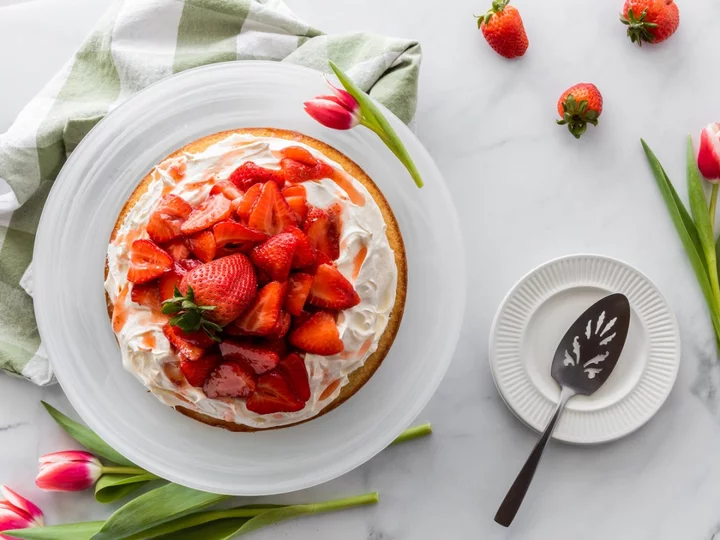
Get set for Wimbledon with these strawberry recipes
Wimbledon is underway and that means the classic British summertime treat of strawberries and cream is ready to be dished out across the courts, with a staggering 1.92 million strawberries expected to be consumed during the tournament. When buying strawberries, we are attracted to the deeper coloured fruits as they are the ripest, but it’s worth being mindful of when you plan to eat them as fully ripe strawberries are best served the same day. Always check the bottom of the punnet to see if the strawberries are starting to bruise as this is a sign they are beginning to be past their best. When it comes to cooking, if you overcook strawberries, you can get a jam-like taste rather than a freshness, so it’s best to use recipes that don’t require a lot of heat and keep it simple for a more refined flavour. Simple touches like adding a dash of lemon will help the strawberries to pack a punch and elevate any recipe. I also like to add a crack of pink peppercorn to macerated strawberries in whatever I’m using them for, this helps enhance the floral notes of the strawberries, as when you eat them the pepper helps open up the nasal passage. Final-worthy dessert: strawberry shortcake Ingredients: For the shortcake: 115g cake flour 5g baking powder 5g salt 3 eggs, separated 1 pinch cream of tartar 175g sugar 15g unsalted butter, softened 5g vanilla extract 125ml milk For the topping: 500g strawberries 1 lemon 75g caster sugar 1 pinch of ground pink peppercorns Method: For the shortcake: Sift and combine all the dry ingredients, then rub the butter into the flour mix. Whisk the egg whites and sugar together until they form medium peaks. Combine the egg yolks and milk with the dry ingredients. Separate into equal-sized balls and bake at 180ºC until golden. For the topping: Quarter or roughly dice the strawberries, cover with the sugar, pepper and lemon zest and leave to sit for 15-20 minutes in the fridge. To serve: Place a few of the shortcakes at the bottom of a bowl or on a large plate. Top with a dollop or two of whipped cream or thick yoghurt, cover with the fresh strawberries and drizzle with the strawberry syrup. Finish by crumbling a shortcake or two over the top. For extra flair: Baste the halves of two peaches and sear in a pan with beurre noisette and a sprig of thyme on a medium heat. Serve on the side of the strawberry shortcake. Quickly served treat: brioche with passion fruit and strawberries Ingredients: For the fruit mix: 500g strawberries 8 fresh passion fruits 60g caster sugar 1 pinch salt For the topping: 200g mascarpone 3 tbsp honey Zest of 1 lemon Brioche to serve Method: Scoop the passion fruit seeds into a small pan and bring to a gentle simmer on a low heat. Add the sugar and the salt and simmer for about 5-6 minutes, until the seeds are shiny. Remove from the stove and allow to cool for five minutes, then pour over your halved strawberries. Place them in the fridge to marinate. To serve: Slice the brioche with a generous thickness, and toast in a pan over a medium heat with a knob of butter, until golden. Flip and repeat. Mix the mascarpone, honey, and lemon zest, spread over the brioche and add a generous amount of the strawberry fruit mix. For extra flair: Roast a handful of pistachios and crush them slightly. The green of the nut against the rich red of the strawberries will add a punch of colour. Read More The Norwegian sparkling wine aged at the bottom of the sea I was an air fryer sceptic – now I can’t stop using it Ditch Deliveroo – make these healthy, 30-minute pizzas instead Three quick and easy vegan fakeaway recipes The dish that defines me: Eddie Huang’s Taiwanese beef noodle soup How to cook kohlrabi
2023-07-11 13:45
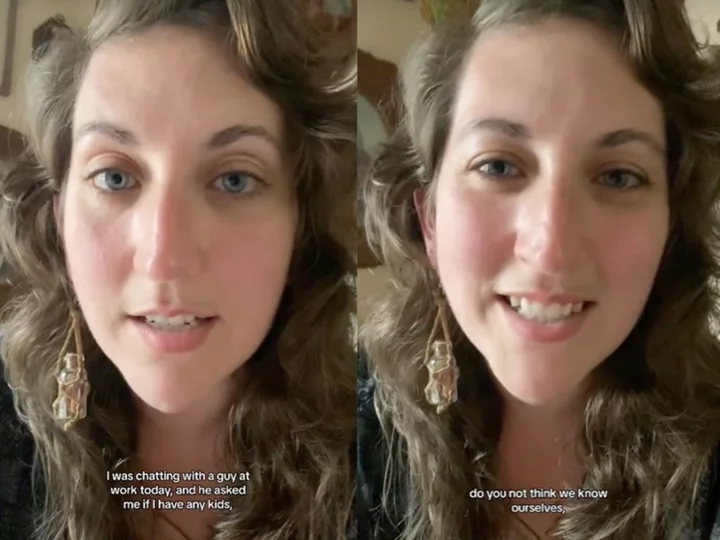
Woman shares male coworker’s ‘infuriating’ response to her decision to not have children
A woman has shared her male colleague’s “infuriating” response when she informed him of her decision to be childfree. Earlier this week, TikTok user @honeyandmud went viral when she recounted the conversation she had with her male coworker, who seemingly couldn’t wrap his head around her choice to not have children. “I was chatting with a guy at work today and he asked me if I have any kids, to which I responded with: ‘Oh no, I’m not gonna have children,’” she began the TikTok, which has since been viewed more than 230,000 times. Her coworker laughed off her response and replied: “You say that now, but never say never,” according to the TikToker. When she further stressed that she knew “for a fact” that she was never going to have children, she said her colleague seemed surprised by her comment, and asked why she didn’t want kids. “I’ve known since I was a child that I don’t want to have kids,” she explained. “I’m 35 years old now and that hasn’t changed and I really don’t see that changing in the future, so yeah, I can confidently say I don’t want kids and I’m never going to have them.” However, her justification didn’t seem to please the male colleague. “Even after that, he still replies with: ‘Well, you never know,’” she said. In the viral video, the woman went on to explain why her frustrating interaction with her coworker was a “common theme” among people who choose to be childfree, or not to have children. @honeyandmud i am so happy you love being a parent, but i promise you that i would not. trust that i can understand that about myself. #childfree #childfreebychoice #childfreemillennial #letusbe #storytime ♬ original sound - honeyandmud “Anytime somebody is choosing to be childfree, there are always people – usually parents – who are like: ‘You’ll regret that one day,’ like they know the person better than the person knows themselves,” she shared. “Do you not think we know ourselves? Do you not think we understand this decision and have thought about this decision and have our reasons why we don’t want to be a parent or bring a child into this world?” “Trust that I know myself, alright?” she added, along with the caption: “I am so happy you love being a parent, but I promise you that I would not. Trust that I can understand that about myself.” The TikToker’s interaction with her male colleague struck a chord for many childfree people in the comments, who took the opportunity to share just some of the many judgemental comments they’ve received because of their decision to not have children. “I chose to be childfree and at 44, STILL get the ‘You never know,’” one person revealed. “I’ll be 40 in a few months and people still want to tell me never say never,” said someone else. “They are still trying to convince me even after I voluntarily paid money to be permanently steralised,” a third user wrote, while another person said: “It’s the most infuriating conversation to have because they act like they know you better than you know you.” “Voluntary childlessness” – also called being childfree – has grown in popularity among US adults in recent years. In November 2021, a survey from the Pew Research Center found that 44 per cent of adults said it is “not too or not at all likely” that they will have children someday, a seven per cent increase from 2018. While there was no single reason why a number of Americans have lost interest in becoming a parent, some survey respondents cited financial burdens or the unsettling “state of the world” as reasons to remain child-free. Earlier this year, childfree TikToker Jackie Dives was praised by viewers for showing “what a life without children can look like”. “I knew in my heart and in my gut that I didn’t want to be a parent,” Dives said in her viral video last March. She added that it was difficult for her to imagine what her life could be without children because there weren’t examples of child-free women “in media or pop culture”. “I had no idea what my life would look like if I didn’t go down the path that everyone expected me to go down,” Dives explained. “It felt really lonely and strange, and I had to go seek out other women who had also made that choice.” Meanwhile, another TikToker sparked a conversation about the sexist double standards that childfree women face after she claimed that her OB-GYN refused to consider her for a tubal ligation to prevent pregnancy. The Independent has contacted @honeyandmud for comment. Read More ‘Child-free’ woman applauded for sharing videos showing ‘what a life without children can look like’ Stop shouting at babies on planes – nobody has the right to a ‘child-free’ existence Woman, 22, sparks debate about medical freedom after doctor refused to sterilise her: ‘I just don’t want kids!’ Schoolboy almost dies from swallowing magnets for TikTok challenge Woman shares honest review of New York City apartment TikTok mom slammed after making 5-year-old son run in 104 degree heat
2023-07-11 06:26

Ryan Gosling says his daughters were ‘huge inspiration’ for his role as Ken in Barbie movie
Ryan Gosling has revealed that his daughters, who he shares with longtime partner Eva Mendes, were a “huge inspiration” for his role as Ken in the upcoming Barbie movie. The 42-year-old spoke about his children, Esmeralda, eight, and Amada, seven, during an interview with Entertainment Tonight on Sunday, while attending the premiere of Barbie in Los Angeles. During the conversation, he shared his daughters’ candid thoughts about his role in the film, which features Margot Robbie as the titular Barbie. “It was, I think, weird enough for them that I played Ken anyway,” he said. “That I might just hold off on them seeing the full Ken-ergy.” However, according to Gosling, his children have not only seen some of Barbie, but they also “helped” him create his character. “They’ve seen a lot pieces of [the film], and helped me a lot with it,” he said. “They were a huge inspiration for me.” When asked if his daughters thought the new movie was funny, the Notebook star quipped: “Yeah, unless it wasn’t. And then I worked on it…They’re brilliant comedians.” While at the Barbie premiere on Sunday, Gosling also gave a subtle shoutout to Mendes with his outfit. The actor walked the pink carpet in a pink Gucci suit, which he accessorised with a chain necklace that had the letter “E”, which stood for Eva, dangling from it. The typeface on the necklace was used for the film. While Mendes wasn’t at the premiere on Sunday, she has previously revealed that she would rather avoid doing press to spend time with her children. “What people don’t know about me is that I love being home,” she said in an interview with Shape in 2017. “Instead of hitting the red carpet, I’d rather be with our girls.” In April, Mendes also revealed why she would not be joining Gosling on the pink carpet, with the Hitch star explaining that she and her partner “don’t do those things together”. Last month, Gosling, who’s been dating Mendes since 2011, shared some rare comments about fatherhood. During his cover story interview with GQ, he revealed that, prior to his relationship with Mendes, he didn’t think much about becoming a father. However, he confessed that this all changed when Mendes told him she was pregnant. “Eva said she was pregnant,” he recalled. “I would never want to go back, you know? I’m glad I didn’t have control over my destiny in that way, because it was so much better than I ever had dreamed for myself.” Elsewhere in the interview, Gosling clarified previous comments he made about the moment Mendes learned she was pregnant. While he maintained that he “wasn’t thinking about kids” before they met, Gosling said: “After I met Eva, I realised that I just didn’t want to have kids without her.” “I was looking for her, you know?” he added. When asked if he was aware that he was searching all his life for his current partner, Gosling replied: “No. But it all makes sense now.” While they have been more open about their relationship in recent years, Gosling and Mendes have still kept their children and family life largely out of the spotlight. Read More Ryan Gosling fans praise actor’s subtle nod to wife Eva Mendes at Barbie premiere Margot Robbie hits Barbie red carpet in 1960s Mattel-inspired gown Margot Robbie, an Australian, briefly forgets what ‘barbie’ means in Australia Margot Robbie hits Barbie red carpet in 1960s Mattel-inspired gown Ryan Gosling fans praise actor’s subtle nod to wife Eva Mendes at Barbie premiere All of the best looks from the Barbie world premiere
2023-07-11 02:17
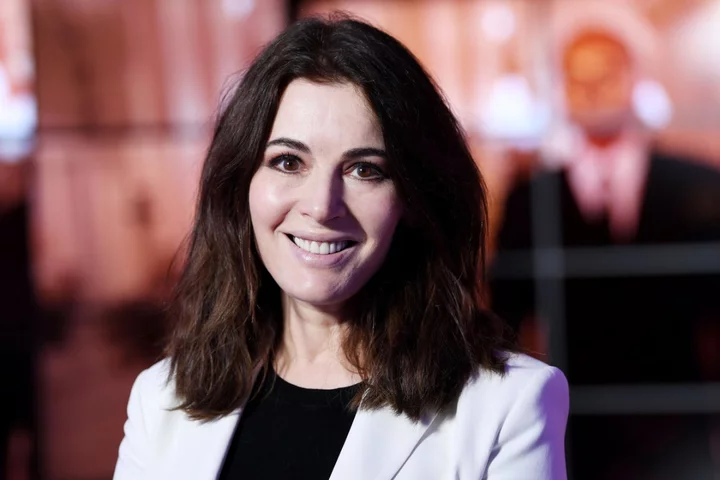
‘We call them Picky Bits’: Nigella Lawson responds to ‘Girl Dinner’ trend
Nigella Lawson has responded to the viral “Girl Dinner” trend that has been sweeping social media. On Saturday, The New York Times detailed the new TikTok phenomenon in an article with the headline: “Is It a Meal? A Snack? No, It’s ‘Girl Dinner’”. According to the publication, the phrase was coined a few months ago by TikTok user Olivia Maher, who posted a video in which she spoke about the virtues of a medieval-style dinner. “I can’t find the TikTok right now but a girl just came on here and said in the Medieval times, peasants had to eat nothing but bread and cheese and how awful that was,” she says in the clip, which has since been watched more then one million times. “And she was like, ‘That’s my ideal meal,’” Maher added before showing her dinner to the camera, revealing a selection of bread, cheese, grapes and pickles. “I call this girl dinner, or medieval peasant.” Maher told The New York Times: “I think the concept of girl dinner came to me while I was on a hot girl walk with another female friend of mine.” “We love eating that way, and it feels like such a girl dinner because we do it when our boyfriends aren’t around and we don’t have to have what’s a ‘typical dinner’ – essentially, with a protein and a veggie and a starch.” The article has prompted a mixed response on social media, with some accusing it of promoting disordered eating while others claim the diet is nothing new and mimics those adopted by mediteranean cultures. “This is a TikTok trend, apparently – bread, cold cuts, cheese, raw veggies,” tweeted writer Tom Hillenbrand. “Most Germans eat like this every evening. We call it Abendbrot.” Lawson replied, quoting Hillenbrand’s tweet: “And we call them Picky Bits.” Read More Schoolboy almost dies from swallowing magnets for TikTok challenge Woman shares honest review of New York City apartment TikTok mom slammed after making 5-year-old son run in 104 degree heat
2023-07-10 23:54

Scientists make surprising discovery that could help boost the global population
Infertility is a problem that afflicts more than a billion people across the world, which is why treatments such as IVF are so important. The procedure (in vitro fertilisation, to use it’s full name) involves the extraction of an egg from the woman's ovaries to be fertilised with sperm in a laboratory and returned to the woman’s womb. The goal is that the resulting embryo will then grow and develop into a foetus, blessing the parent or parents with a baby. However, success rates for IVF – as in, the percentage of treatments that result in a live birth – remain somewhat unencouraging: 32 per cent for women aged under 35; 25 per cent for women aged 35 to 37, with the numbers continuing to drop the older you get, according to the NHS. Nevertheless, a major new study has revealed a striking new finding which could help boost the hopes of countless aspiring mums and dads across the world. Sign up for our free Indy100 weekly newsletter After analysing 3,657 frozen embryos over a period of eight years, researchers in Western Australia found that IVF was much more likely to work when eggs had been harvested in the summer. The team clarified that it didn’t seem to matter when the embryos were transferred to the mother’s womb, just when the eggs were collected. Indeed, the likelihood of babies being born when the eggs had been retrieved in the summer was 30 per cent higher than when they had been retrieved in the autumn, according to the scientists. The team also found that the temperature on the day of egg collection didn’t seem to have an impact on success rates, but the number of sunny hours did. Of the embryos they tested, those harvested on days that had the most sunshine were 28 per cent more likely to result in a live birth compared to the darkest and most overcast days. “Our study suggests that the best conditions for live births appear to be associated with summer and increased sunshine hours on the day of egg retrieval,” the study’s lead, Dr Sebastian Leathersich, of Perth’s King Edward Memorial Hospital, said about the paper, which was published in the journal Human Reproduction. Still, he noted: “There are many factors that influence fertility treatment success, age being among the most important. “However, this study adds further weight to the importance of environmental factors and their influence on egg quality and embryonic development." He further explained: “We effectively separated the conditions at the time of egg collection from the conditions at the time of transfer, demonstrating that environmental factors when the eggs are developing are as, if not more, important than environmental factors during implantation and early pregnancy.” The expert obstetrician and gynaecologist added: “Optimising factors such as avoiding smoking, alcohol and other toxins and maintaining healthy activity levels and weight should be paramount. However, clinicians and patients could also consider external factors such as environmental conditions.” Despite Dr Leathersich and his colleagues concluding that the temperature on the day of egg collection had little bearing on the success of the process, they also found that the temperature on the day of embryo implantation did make a difference. The chances of a live birth rate decreased by 18 per cent when the embryos were transferred on the hottest days (when average temperatures measured between 14.5C and 27.8C) compared to the coolest days (0.1C to 9.8C), and there was a small increase in miscarriage rates, from 5.5 per cent to 7.6. The finding that miscarriage rates were highest when embryo transfer took place on the hottest days is consistent with other studies showing higher rates of miscarriage in the summer months. “This suggests that the negative effects of high temperature are more likely related to early pregnancy rather than egg development,” Dr Leathersich concluded. When it comes to the disparity in success rates between eggs retrieved in summer and autumn, he and his team pointed out that melatonin levels could be at play. Differences in lifestyles between the winter and summer months may also play a role, he and his colleagues acknowledged. "It is possible that there are differences in activity, diet, and lifestyle in different seasons which could underlie the observed differences in live birth rates, though such data were not collected in this study," they wrote. "It is also possible that other environmental factors, including pollutants, may impact clinical outcomes." Whilst the study’s findings are compelling, Dr Leathersich and his team admitted that it did have its limitations. The research was done in hindsight, using eggs that had been frozen, then thawed, so it could not draw watertight conclusions. “Ideally, these findings should be replicated in other sites with different conditions and different treatment protocols to confirm the findings,” Dr Leathersich said. “It would also be interesting to look at the impact of season and environmental factors on sperm parameters, as this could have contributed to our observations.” He added: “We are now planning to analyse this same group of patients using air quality data, as there may be seasonal changes in exposure to harmful pollutants which could negatively affect reproductive outcomes. “Finally, given the huge increase in so-called 'social egg freezing' for fertility preservation and the fact that this group generally have flexibility about when they choose to undergo treatment, it would be very interesting to see if these observations hold true with frozen eggs that are thawed and fertilised years later. “Any improved outcomes in this group could have big impacts for women making decisions about their future fertility, but the long-term follow-up required means it is likely to be some time before we can draw any conclusions for this population.” Have your say in our news democracy. Click the upvote icon at the top of the page to help raise this article through the indy100 rankings.
2023-07-10 23:22
